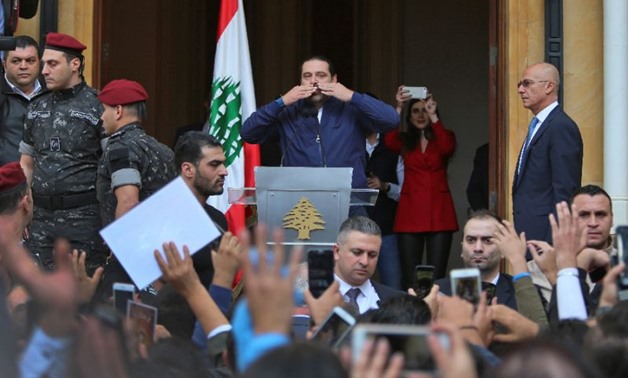
Lebanese Prime Minister Saad Hariri greets his supporters upon his arrival at his home in Beirut on November 22, 2017 after nearly three weeks of absence during which he announced his shock resignation from Saudi Arabia. AFP
CAIRO - 23 November 2017: When Saad al-Hariri announced his resignation on November 4 in Saudi Arabia, the region and the world at large watched in shock. Not only did his resignation come out of nowhere, but its issue from the Kingdom led many observers and those close to Hariri to question its authenticity. To this degree, Lebanese President Michel Aoun refused to accept Hariri’s resignation, demanding he deliver it in person.
Citing fear of assassination, along with Hezbollah and Iran’s “unacceptable influence” over Lebanese politics, Hariri offered what was perceived by many to be an unconvincing resignation. This comes 12 years after Hariri’s father, then-Prime Minister Rafiki Hariri, was executed by supposed Hezbollah terrorists.
The bizarre nature of Hariri’s resignation two weeks ago prompted fears that it had been issued under duress, and that he was being held under house arrest along with hundreds of other Saudi citizens who have been rounded up by Crown Prince Mohammed bin Salman under corruption charges.
However this, arguably critical, viewpoint appears to have been partially refuted as Hariri made subsequent visits to France and Cairo, meeting with Macron and Sisi respectively; it doesn’t take an expert to deduce the focus of these meetings.
 Lebanese Prime Minister Saad Hariri (R) is greeted by Egyptian President Abdel Fattah al-Sisi upon his arrival in Cairo. AFP/Dalati and Nohra
Lebanese Prime Minister Saad Hariri (R) is greeted by Egyptian President Abdel Fattah al-Sisi upon his arrival in Cairo. AFP/Dalati and Nohra
With Hariri’s return to Lebanon on Tuesday, there is hope that the political crisis his resignation caused may have come to an end. Hariri stated that he has put his resignation “on hold”, awaiting discussion with President Aoun and the Lebanese government. This not only gives weight to the theory that Hariri was coerced into resigning, but also indicates a possible break from Saudi Arabia. While the Kingdom may have hoped to fracture Lebanese politics and ignite opposition to Hezbollah, the Lebanese Parliament remained remarkably sturdy.
“The Lebanese government and parliament took three unexpected steps. First they united, second they demanded their prime minister be returned to his country and third they accused Saudi Arabia of holding him against his will,” wrote Joumanah El Matrah for the Guardian.
Following state celebrations honoring Lebanese Independence Day, Hariri presented President Aoun with his resignation; however he subsequently accepted the President’s offer to “postpone” the decision.
“Our beloved nation today needs at this critical time exceptional efforts from everyone to protect it against danger,” said Hariri said during the Independence Day celebrations. “We must dissociate from wars, external struggles and regional conflicts.”
Lebanon’s borders are routinely violated and the country is no stranger to war. Unfortunately, it appears increasing likely that Lebanon’s territorial integrity will have to make way for a clash between the region’s big beasts. Saudi has warned that Hezbollah – removed from the IRGC in name only – has initiated an “act of war” by participating in the Lebanese government; an act of war against both the Lebanese people and the Kingdom itself.
 Hezbollah fighters carry the coffins of comrades who were killed in battles in Syria during their funeral on September 21, 2015 in the town of Baalbek in eastern Lebanon's Bekaa Valley. AFP/STR
Hezbollah fighters carry the coffins of comrades who were killed in battles in Syria during their funeral on September 21, 2015 in the town of Baalbek in eastern Lebanon's Bekaa Valley. AFP/STR
The Lebanese state hasn’t, and doesn’t possess the military hardware capable of withstanding foreign intervention, and as the wars in Syria and Yemen continue to show us, international law has no footing in the Middle East while members of the P-5 have a stake.
Avoiding differences of ideology and religion, Iran and Saudi Arabia remain two power-hungry warriors looking out over an open playing field. Iran plays the puppet master while sitting on the periphery, yet unfortunately for Saudi Arabia it finds itself enclosed by aggressive Iranian influence.
From its southern border, Houthi rebels are engaged in fierce conflict with the Saudi-backed government. Making use of Iranian hardware, the rebels fired a missile towards Riyadh, which while intercepted mid-flight, has led to the Saudi imposition of a two-week total blockade of Yemen. Across the Arabian Gulf to the east, Iran stands strong. To the north, Iranian-backed Hashd al-Shaabi militia hold the key to military power in Iraq, while Hezbollah lie in wait just beyond Jordon.
While Iraq provides an unparalleled mix of complications, Hezbollah’s influence in Lebanon and throughout the region is publically objected by much of the world. So much so that Hezbollah is designated a terrorist organisation by much of the West.
While Hariri remains a receptive ally of Saudi Arabia, his return to Lebanon creates a fresh opportunity for the country, and fresh difficulties for the Kingdom.
Twitter:



Comments
Leave a Comment